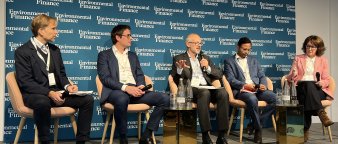Earlier this summer, the Norwegian government proposed opening an area of ocean nearly the size of Germany to deep-sea mining. If ratified by the Parliament, Norway becomes the first country to extract metals from its sea floor. At first glance, deep-sea mining may sound like an opportunity. Cobalt, lithium and rare earth metals can be extracted from deep-sea mining, at a time when these metals are in dire need for the net-zero carbon transition.
Although we need these kinds of minerals to combat climate change and for the transition to a green economy, there is a growing recognition that a sustainable energy transition cannot be built at the cost of destroying nature. The decisions we make today need to benefit both climate and nature.
The Global Biodiversity Framework which was adopted last year, sets out an ambitious and synergetic agenda, calling on stakeholders to keep in mind the intricate linkages between biodiversity and climate change when taking actions.
Irreversible loss
Ocean health is under increasing stress, faced with the triple crises of climate change, nature loss, and pollution – exposing the industries, businesses and livelihoods that rely on the ocean to serious risks. Even though commercial deep-sea mining has not yet commenced, current scientific consensus suggests that deep-sea mining will be highly damaging to ocean ecosystems. Plans to mine this unique and complex area would create irreversible ecosystem and habitat loss, as well as permanently destroy invaluable carbon storage.
We strongly believe that the ocean is worth more than just the value of its finite resources. That is why we have signed the WWF call for global moratorium on deep sea mining, and why we encourage our peers to choose alternative strategies rather than supporting growth of the nascent and highly risky deep-sea mining sector.
At present, no robust, precautionary approach exists to safeguard the ocean against the potential ecological impacts of deep-sea mining. Storebrand will therefore not invest in companies involved in deep-sea mining until we have more scientific knowledge on the impacts of these activities. Significant challenges must be overcome before the sector can be recognised as environmentally and economically sustainable. These challenges present potential investors with immense risks.
Alternative solutions already exist
We are working with our investees to reduce the environmental footprint of terrestrial mining and support the transition toward a circular economy that promotes the reuse of raw materials in the economy, making current minerals demand obsolete. From battery manufacturers to EV producers, companies are making moves to reduce perceived dependence on minerals, including those from the deep sea. Reducing consumption of these minerals is just one piece of the puzzle.
Seldom do we have an opportunity to stop an environmental crisis before it begins. This is one of those opportunities.







